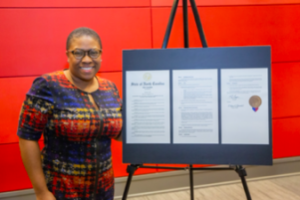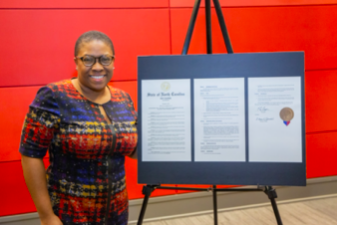 LaTanya Pattillo is truly a woman wearing several hats. By way of the city of brotherly love, Philadelphia, she hails from the Sandhills of North Carolina. LaTanya Pattillo is a wife, mother of five, and a lifelong educator. Her determination and persistence to advocate for others comes from her homegrown roots in Columbus County. Mrs. Pattillo began her professional career after receiving her Bachelor of Science in Business Administration from American University in Washington, D.C.
LaTanya Pattillo is truly a woman wearing several hats. By way of the city of brotherly love, Philadelphia, she hails from the Sandhills of North Carolina. LaTanya Pattillo is a wife, mother of five, and a lifelong educator. Her determination and persistence to advocate for others comes from her homegrown roots in Columbus County. Mrs. Pattillo began her professional career after receiving her Bachelor of Science in Business Administration from American University in Washington, D.C.
Currently, Mrs. Pattillo serves as the Teacher Advisor to Governor Roy Cooper of North Carolina. Her primary role is to serve as the voice of the practitioner in the Office of the Governor while interacting with educators and other educational stakeholders to listen to their concerns, and to use their feedback to inform both policy and the priorities of the Governor. Mrs. Pattillo oversees the Governor’s Teacher Advisory Committee as well as supports the The Governor’s Educator Discovery Award.
LaTanya’s responsibility includes impacting educational policy on a local, state, and national level. She has served as a member of a local planning board, as an active committee member of statewide organizations and associations, and as an advisor to advocate for the work of national non-governmental organizations. LaTanya is a 2013-2014 Kenan Fellow with NC State University and has been recognized as the 2015-2016 Columbus County Schools Teacher of the Year and as a finalist for the Sandhills Region Teacher of the Year. Prior to her career in K-12 education, LaTanya served as Assistant Director of Alumni Relations at American University in Washington, DC. She received her bachelor’s degree in Business Education from the Kogod School of Business at American University. She enjoys many things, but laughing and quilting are at the top of the list.
Cooke: “Where and for how long did you teach?”
Pattillo: “I taught Business Education for eight years at East Columbus High School in Columbus County. But that wasn’t my start in education. I created an afterschool arts program, so I started out as a parent volunteer in the elementary school, became a media/teacher assistant after four years, and then became a teacher.”
Cooke: “What are some of your favorite memories?”
Pattillo: “I enjoyed teaching and being part of a professional community. Over the years I built lasting relationships with students and a family with many of my co-workers. There are some good people in our public schools who really want what is best for students and families. I do miss that close knit school environment. It wasn’t always rosy but it helped mold me into who I am today.”
Cooke: “When did you begin working with Gov. Cooper?”
Patillo: “I began working in the Governor’s Office in March of 2017, straight out of the classroom. It has definitely been a learning experience, but I love people and the work is critical.”
Cooke: “Was that a professional goal?”
Pattillo: “Working on a statewide level was certainly a goal. As I became more engaged in broad education issues, I knew the value of connecting with so many people across the state who are passionate about education. And not just those who are passionate, but those who are working day in and day out to improve education in NC. It has been a pleasure and an honor.”
Cooke: “How do you connect your experiences in the classroom to working with the governor and legislators?”
Pattillo: “One thing that I have learned is that any work that we do begins with people. It is all about mutual respect, relationships, and expertise. In the classroom we had to get to know everyone of our students and their families. We know how to connect with people and do it quickly. Students won’t learn from people they don’t respect and I think that applies in any situation. Adults won’t collaborate or attempt to work towards a common resolution if there is no sense of mutual respect. I enjoy taking time to learn about people in order to figure out how to work towards a common goal. And I have the pleasure of connecting with so many people from a variety of backgrounds and interests, even if we are all working for education.”
Cooke: “What is the most challenging part?”
Pattillo: “The most challenging part was having to shift hats. Once a teacher always a teacher, but I often had and still do have to think about K-12 education more broadly. I never lost my practitioner perspective, but through this work, I have been able to stretch my mind in ways that have only supported my opinions and instincts.”
Cooke: “The DRIVE Summit was a successful initiative under your leadership. Tell us about how that came to life and what outcomes will be beneficial to North Carolina?”
Pattillo: “The DRIVE Summit was a result of the realization that our educational landscape is changing, and we must change with it. While I was teaching, I was able to understand the importance of having representation in the classroom – I knew what it meant for expectations particularly for black and brown students and their levels of achievement. How students are treated and their access to learning very much has to do with the belief and mindset of the people leading the classroom and the system. There are so many organizations, groups, and researchers who were having conversations, doing research around this equity in education and diversifying the education workforce. But we quickly realized that there had been no real statewide initiative around addressing it. So, the timing was right. We made sure to engage as many, honoring the work that is already being done in communities. We had around 300 people attend the event at NC State to hear about why educator diversity is critically important to student achievement and outcomes.”
Cooke: “It certainly is time to acknowledge that there is a need for representation in all areas of education. How do you see this particular initiative moving from conversation to action steps under the leadership of our state’s current leadership?”
Pattillo: “At the Summit, Governor Cooper established the DRIVE task force through an Executive Order that will continue the work of the Summit. The task force will provide a report to the Governor with actionable goals and strategies about how we can increase recruitment, placement, support and retention of educators. We have to face some harsh realities about our system and how black and brown kids are faring it. Again, this is only one aspect of what we need to do when addressing equity in education for all. And it is an important nationwide issue that must be addressed here in NC and also the nation.”
Cooke: “How do you balance giving energy to educators, policies, and your family?”
Pattillo: “Whew. I take it day-by-day. I have a wonderful husband and support system to make me sit down when I need to. As a wife and mother of five, I can tell you that my world is demanding, exciting, and dynamic. It is never boring. Self-care is a must and I learned the hard way the toll that stress can have on your mind and your body. So I make choices that involve me putting myself first so I can then support others better.”
Cooke: “What advice do you have for young ladies who want to follow in your footsteps?”
Pattillo: “Love yourself, work hard, trust yourself and your gut, know your greatness, find a mentor, embrace the process, DO IT!
Cooke: Yes! That is wonderful and necessary advice! What are some of your professional long term goals?”
Pattillo: “My long term goals are to keep learning, growing, and representing. That includes finding seats at established tables and creating my own table. First and foremost, I want to support others in reaching their goals. I was able to achieve my goals through the support and guidance of others and so it is both my responsibility and my duty to do the same.”
 NaShonda just recently finished her 20th year teaching in North Carolina Public Schools. Arriving by way of Pennsylvania, she enjoys working with students of all ages and abilities. She’s been featured in TIME magazine for her continued advocacy to improve public education. She lives in Wake County
NaShonda just recently finished her 20th year teaching in North Carolina Public Schools. Arriving by way of Pennsylvania, she enjoys working with students of all ages and abilities. She’s been featured in TIME magazine for her continued advocacy to improve public education. She lives in Wake County

There are no comments
Add yours